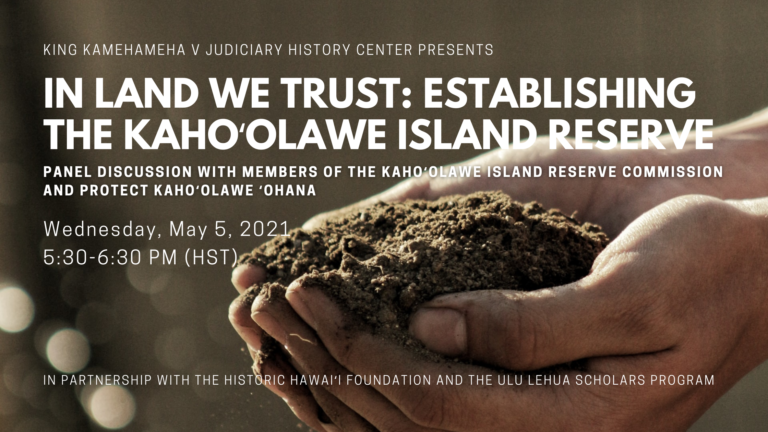
In Land We Trust: Establishing the Kahoolawe Island Reserve
Wednesday, May 5, 2021
5:30-6:30 pm
Kahoolawe has experienced vastly different uses over its history, from natural oasis and ancient Hawaiian settlement, to penal colony, ranch lands, and military bombing range. In May 1994, title to the island of Kahoolawe was transferred from the United States Navy to the State of Hawaii through the recently established Kahoolawe Island Reserve Commission (KIRC). This victory came after decades of community activism against environmental destruction and growing wishes to reclaim Native Hawaiian access to and stewardship of the island.
In this program our presenters, Stanton Enomoto of the US Department of the Interior, Michael Nahoopii of KIRC, and Dr. Davianna McGregor of the Protect Kahoolawe Ohana, share what legislative steps were taken to relinquish military occupation and how community engagement helped achieve this. They also discuss the responsibilities of KIRC, current Kahoolawe land use policy, and what progress has been made to restore the beloved island.
This program was created in partnership with the Historic Hawaii Foundation, a statewide non-profit that helps people save historic places through education, advocacy, assistance and protection of and for significant sites, and the Ulu Lehua Scholars Program, established by the William S. Richardson School of Law in 1974 to make legal education accessible to members of Hawaii’s diverse communities.
Presenters
Senior Program Director for the U.S. Department of the Interior, Office of Native Hawaiian Relations
Stanton Enomoto worked for the Kahoolawe Island Reserve Commission from 1995-2004 during the US Navy’s Unexploded Ordnance (UXO) clearance project on the island and oversaw the transfer of access control to the State of Hawaii. He received his bachelor’s degree in Geology and Environmental Studies from Macalester College in St. Paul, Minnesota. He was raised on Maui and graduated from the Kamehameha Schools.
Stanton has spent nearly the entirety of his 30-year career in public service focusing on environmental, natural & cultural resource management, planning, and Native Hawaiian issues. In addition to his current position and past work on Kahoolawe, he has worked for the US National Park Service, the Pacific Islands Climate Change Cooperative, the Office of Hawaiian Affairs, the Hawaii Community Development Authority, and the Hawaii Department of Health.
Executive Director, Kahoolawe Island Reserve Commission
Michael has been involved with Kahoolawe from virtually every perspective in its recent history. A long-time Protect Kahoolawe Ohana (PKO) member and former US Navy Officer-in-Charge of Kahoʻolawe during the conveyance of the island to the State of Hawaiʻi, he was a senior manager during the early Model Cleanup and the later Navy Unexploded Ordnance (UXO) clearance project.
Born in Honolulu, Michael graduated from the Kamehameha Schools in 1982. He received his BS in Electrical Engineering from the US Naval Academy at Annapolis and was commissioned an ensign in 1986, serving as a nuclear-trained submarine officer until his assignment to Kahoʻolawe. In 1992, he received an MBA in accounting from Chaminade University. Michael is certified as a Quality Manager and Quality Engineer by the American Society for Quality, and holds the designation of Project Management Professional from the Project Management Institute.
Protect Kahoolawe Ohana member and Director of the Center for Oral History, Ethnic Studies Department, University of Hawaii at Manoa
Davianna is a professor and historian of Hawaii and the Pacific and a founding member of the Ethnic Studies Department at UH Manoa. She teaches courses on Native Hawaiians, Land Tenure and Use, and Economic Change in Hawaii. She has been a member of the Protect Kahoolawe Ohana (PKO) since its founding in 1976, serving as a steward and helping to coordinate cultural field work on the island. She is director of the Molokai Land Trust seeking to protect and restore the land and natural and cultural resources of Molokai to perpetuate the island’s unique Native Hawaiian traditions.
Davianna’s work focuses on the persistence of traditional Hawaiian cultural customs, beliefs, and practices. She wrote the book Na Kuaaina: Living Hawaiian Culture (UH Press, 2007), which won the Kenneth W. Balridge Prize for best book in any field of history written by a resident of Hawaii 2005–2007. Davianna is a graduate of UH Manoa, where she earned her bachelor’s degrees in Asian/Pacific History and Secondary Education, a master’s degree in Pacific Islands Studies, and doctorate in Hawaiian/Pacific History.
